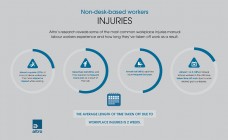POS software market to see 9.57% CAGR in 7 years, says this report
By Retail4Growth Bureau | April 08, 2024
According to a new report released by Pune based 360iResearch, the POS market is projected to grow from a size of $11.23 billion in 2023 to reach $21.31 billion by 2030, with the move toward cloud based POS driven by the demands of the modern retail environment, which prioritizes flexibility, scalability and real-time functionality.
 According to a new report released by 360iResearch, a Pune based market research and business consulting company, the POS market is projected to grow from a size of $11.23 billion in 2023 to reach $21.31 billion by 2030, at a CAGR of 9.57% over the forecast period.
According to a new report released by 360iResearch, a Pune based market research and business consulting company, the POS market is projected to grow from a size of $11.23 billion in 2023 to reach $21.31 billion by 2030, at a CAGR of 9.57% over the forecast period.
Revolutionizing Retail and Service Industries: The Global Surge in Cutting-Edge POS Software Adoption
“Businesses worldwide are increasingly leveraging POS software to enhance operational efficiency and customer engagement with the rise of mobile and cloud-based technologies, along with integrated payment solutions. Challenges include initial costs and data security concerns, as well as advancements in blockchain, AI, and machine learning, which present promising avenues for growth, particularly in optimizing cybersecurity and refining customer service strategies.,” says the report.
The Americas, with its advanced tech infrastructure, is at the forefront of POS innovation, fueled by a strong eCommerce sector. Europe's demand for POS systems is shaped by its regulatory environment, emphasizing compliance and sustainability. Meanwhile, the APAC region witnesses rapid growth, driven by digital transformation and a shift toward cashless societies, making POS software necessary in modern business ecosystems.
Cloud-Based POS Systems Revolutionize Business Operations: A Shift Toward Smarter, More Efficient Retail
The report adds that the POS software industry is undergoing a transformative shift as businesses increasingly embrace cloud-based POS solutions, heralding a new era in operational efficiency and market expansion. This move toward cloud services is driven by the demands of the modern retail environment, which prioritizes flexibility, scalability, and real-time functionality. Cloud-based POS systems are preferred for their ability to seamlessly integrate various operations, offer superior security measures, and provide a cost-effective alternative to traditional setups. They offer access to real-time data and analytics, enabling businesses to make well-informed decisions and customize the shopping experience for their customers. Their scalable nature also means that businesses, regardless of size, can easily adjust to evolving market trends and consumer preferences without hefty investments in infrastructure. This technological evolution is especially significant for small and medium-sized enterprises (SMEs), facilitating their access to sophisticated POS solutions and contributing to widespread market growth.
The Comprehensive Impact of POS Software on Customer Engagement, Employee Management, and Inventory Control
As the report points out, Point of sale (POS) software is for businesses keen on optimizing operations and enhancing customer relations. POS systems are ingeniously designed to foster customer loyalty through personalized marketing strategies, enabling businesses to offer targeted rewards and promotions based on insightful customer data and purchase histories. Such capabilities significantly boost customer retention and promote recurring business engagements. Moreover, POS software stands as an invaluable asset for augmenting employee productivity, providing essential features like schedule coordination, time tracking, and insightful performance analytics. The incorporation of robust inventory management tools within POS systems offers the added advantage of real-time stock monitoring, automatically reorder alerts, and comprehensive analytics, thereby ensuring optimal stock levels, reducing inventory surplus, and facilitating informed decision-making on product selection and procurement.
Pic courtesy: freepik.com









Comments